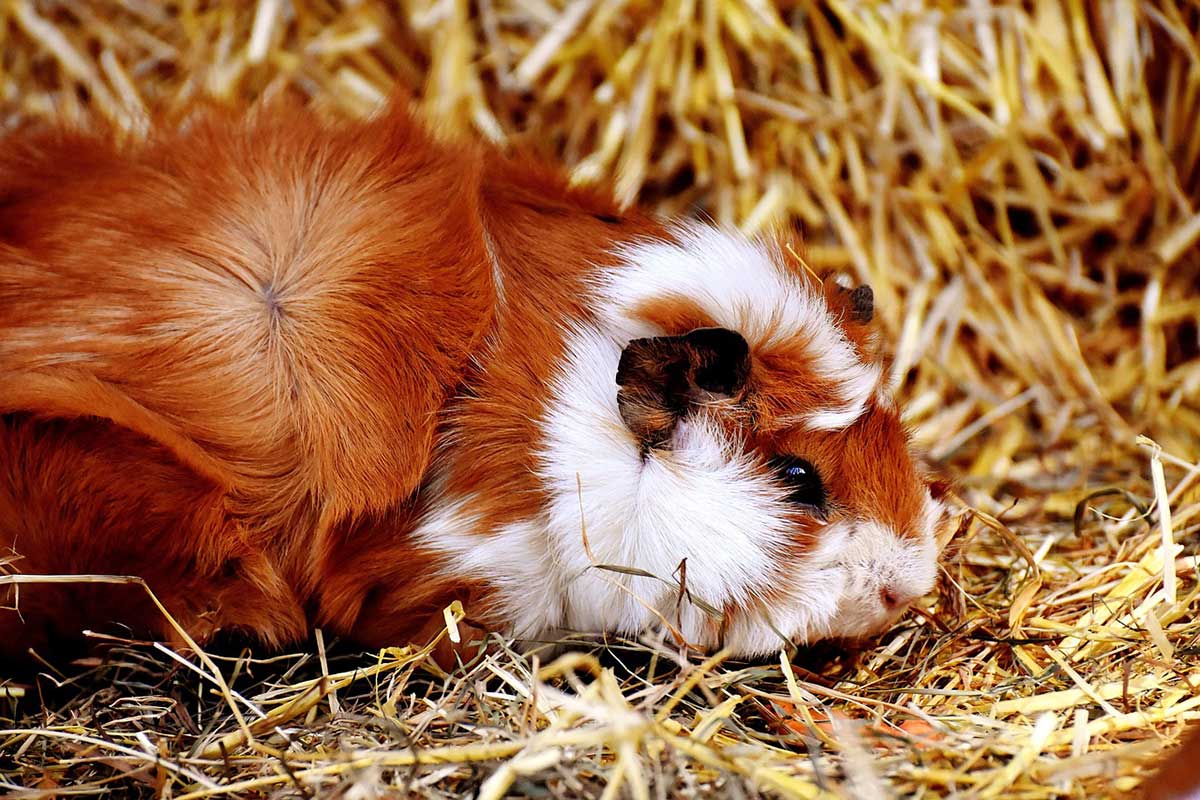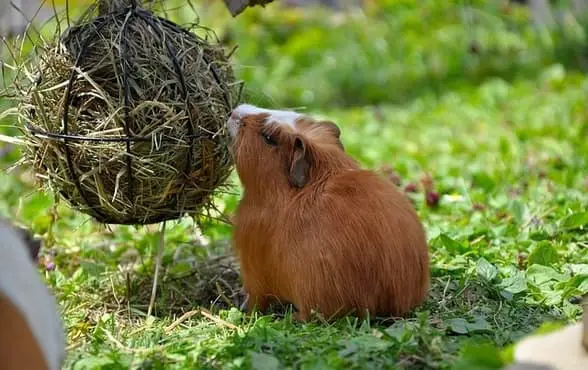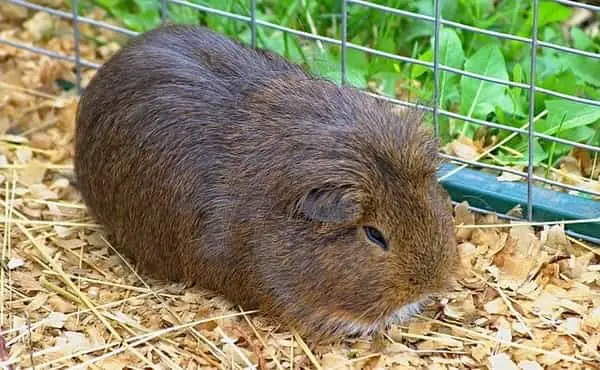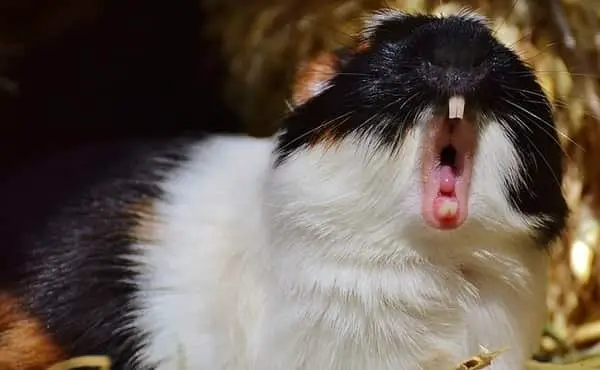Usually guinea pigs are only interested in their food, treats, and water, but sometimes, they eat things they’re not supposed to. One of these things can be bedding. Eating bedding is never good for your pet, and in large amounts, it can threaten your guinea pig’s life.
So, why is my guinea pig eating bedding? In most cases it’s because your guinea pig is either bored and trying to keep themselves occupied, hungry or dehydrated, or has dental problems, or more specifically overgrown teeth, and is chewing on their bedding to help keep their teeth trimmed down.
Today, we’ll talk about ways to spot these problems in your guinea pig and what you can do to help.
Boredom
Guinea pigs are extremely intelligent and curious creatures, and they love to explore. They learn fast and they need variety in order to stay entertained. They can tell your voice apart from other voices, navigate mazes, and find hidden treats. Ultimately, guinea pigs need a lot of stimulation and interaction.
So, if your guinea pig isn’t being challenged enough, they might be eating bedding to entertain themselves. Animals and humans alike turn to snacking for stimulation. For both species, eating triggers positive chemicals in the brain and leads to satisfaction.
So, for a bored guinea pig who can’t find other ways to keep itself busy, eating bedding might seem like a good solution. Luckily, there are a few solutions to this problem.
Toys
Chewing is critical for your guinea pig. It relieves stress and keeps their teeth–which never stop growing–in shape. It prevents dental diseases and pain for your pet. This is why there are a lot of toys made for chewing.
These toys exist in a range of forms. From woven balls of grass to wood balls with bells to chewable tunnels, lots of things exist to satiate your guinea pig’s need to chew, and most of them are sold at your local pet store!
Another thing that’s great for these curious and exploratory creatures are games with treats. Using treats in bowls, you can teach guinea pigs color. You can also form a small maze and put a treat at the end, or you can place a treat in a part of their cage that will require them to learn a skill to get it (for example, standing up). You can even create obstacle courses in one of the rooms of your house.
The last way we’ll talk about to keep your guinea pig entertained and stimulated is attention. Guinea pigs love being with their people! Much like dogs, guinea pigs are extremely social creatures. They need socialization at least once a day, so simply spending time with your guinea pig may help them stop eating their bedding.
A Friend
Socialization is incredibly important for your guinea pig. Without it, they may fall into depression or develop bad behaviors–such as eating bedding, like we’ve been talking about.
But we get it, sometimes dedicating that much time to your guinea pig is challenging, especially if you’re a student or a full time employee. Pet owners across the board understand, and so they do something incredibly smart–they get their pet a friend!
Because guinea pigs are very social creatures, it’s easy for them to get lonely. They’re awake 20 hours of the day and if they don’t have enough to do, it’s very easy to get bored all alone–hence why your guinea pig may be eating its bedding. You’ll still have to socialize with your pig once a day, but their friend will keep them company for the rest of the time.
Guinea pigs also form emotional bonds like humans. While your guinea pig will form those bonds with you either way, getting a second piggie will satisfy the biological need to befriend another of its species.
Lastly, guinea pigs feel safer when they have a second guinea with them. Outside of domestication, guinea pigs live in groups, with an alpha male and multiple females. They live this way because they’re prey animals and are hunted in the wild by animals higher in the food chain. Thus, guinea pigs feel better when they have other guinea pigs with them.
If you do decide to go this route, a good idea may be to keep the two guinea pigs in separate cages that are next to each other so they both have enough room and don’t fight or bully each other territorially.
Excess Hunger or Dehydration
The next reason your guinea pig may be eating their bedding is because of hunger and/or dehydration. Guinea pigs require a diet of unlimited hay along with rationed amounts of pellet food and water, along with vitamin C–which is typically given to them in the form of water drops.
If your guinea pig is lacking any of this in its diet, it may be driven to search for it elsewhere, like its bedding.
One solution for this could be switching the food you’re giving your guinea pig–or increasing the quantity. Recommended quantities are given on the bag, but these can be adjusted if your guinea pig is underweight or needs more food for some reason, like when pregnant for example.
You can increase how much you feed for hay too, but beyond that, there are also different types of hay–grass and legume, and grass (specifically timothy) is the best for your guinea pig. If your guinea pig isn’t eating the right things, they could be missing out on a lot of important nutrition, and there are a few good ways to combat this.
First of all, you need to make sure your guinea pig’s water and hay are unlimited. Unlike food, hay doesn’t need to be portioned out. Guinea pigs need to chew practically all day every day to combat their always growing teeth, and hay is one of the major ways they do that. Hay also gives them a lot of important nutrients.
Second, guinea pigs benefit greatly from fruits and vegetables. A list of fruits and vegetables guinea pigs love to eat are:
- Lettuce
- Carrots
- Peas
- Tomatoes
- Red and green bell peppers
- Oranges
- Apples
- Pears
- Strawberries
- Kiwi
- Peaches
You can also get your guinea pig new and improved treats to keep them from eating their bedding.
Dental Needs
We covered this briefly earlier in the article, but we can afford to talk about it again: your guinea pig’s teeth are always growing. If they don’t have the opportunity to chew things and trim down their teeth, their teeth will grow into their gums and create a lot of dental problems.
Lack of chewing is one of the main causes of guinea pig dental disease. Teeth can grow sharp and poke their cheeks and even overgrow so much that they can’t chew their food anymore.
There are a few warning signs of dental disease in guinea pigs. Changing in eating preferences and excessive salivation are, perhaps, the earliest and most important ones. The other symptoms don’t show up until later in the disease’s progression, at which point the situation is more urgent than earlier on. Later on, dental disease presents as:
- Weight loss
- Weakness
- Facial swelling
- Respiratory infections
- Vocalisation (out of the ordinary)
If your cavy is showing any of these symptoms, the best course of action is a visit to the veterinarian, who will diagnose dental disease via oral examination and x-rays. This disease is very serious and can lead to death.
If your guinea pig is eating their bedding, they may be trying to keep their teeth in check. You can easily solve this by giving them something else to chew instead.
Other Methods
If none of the previously mentioned methods are working, there are a couple other things you can try to keep your guinea pig from eating their bedding. One of those methods is to change their bedding. Giving them a different type of bedding may deter them from eating it.
If that still doesn’t work, you can put a layer of hay on top of their bedding as a last resort. That way, they may be trying to chew their bedding, but they won’t be able to find it beneath the hay (which is what they should be eating anyway).
Conclusion
Eating bedding is very unsafe and can have serious ramifications for your guinea pig, including health complications. In some situations, your guinea pig may be suffering from dental disease, so if you’ve noticed any behavior that’s out of the ordinary, be sure to get an exam from your veterinarian.
However, the more likely causes of this problem are boredom or a lack of available food. The good news is, these are problems that you can easily solve by giving your guinea pig toys, affection, and a constant stream of hay. With these easy solutions provided in this article, your guinea pig should be back to normal in no time!




